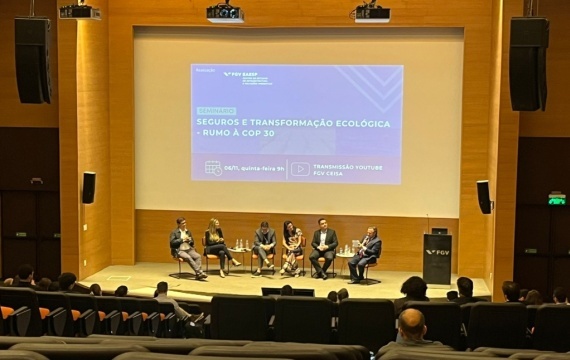FGV Hosts Debate on Insurance and Ecological Transformation
“A day dedicated to the convergence of the insurance world with the world of ecological transition,” was how Alessandro Octaviani, Superintendent of the Superintendence of Private Insurance (Susep), described the seminar “Insurance and Ecological Transformation – Towards COP30.” The event, organized by the Center for Infrastructure Studies and Environmental Solutions at Fundação Getulio Vargas (FGV Ceisa), took place on November 6 in São Paulo, gathering representatives from government, the insurance sector, experts, and academics.
The meeting discussed the role of insurance in the ecological transition and in building a more resilient and sustainable economy, focusing on innovative financial and regulatory instruments that can accelerate Brazil’s green agenda.
At the opening, Guilherme Checco, Acting Deputy Executive Secretary of the Ministry of Environment and Climate Change (MMA), reflected on the purpose of the carbon market:
“When talking about the carbon market, the commercial impulse is to focus on transactions, costs, and prices, but we cannot lose sight of the purpose of these instruments: to assist in the gradual reduction of greenhouse gas emissions. This is the mission that connects the economic system to the world we want.”
Checco also warned about the urgency of these discussions:
“There is a short window of opportunity. By 2040 or 2050, if we have not advanced toward emissions neutrality, we will be in a scenario far removed from what we desire.”
On the occasion, Gesner Oliveira, coordinator of FGV Ceisa, emphasized that the center has a strong focus on integrating the public sector, private sector, and academia—a factor that becomes even more important on the eve of COP30.
From the Ecological Transformation Plan to the Carbon Market
Opening the program, the Ministry of Finance presented the Ecological Transformation Plan, which aims to ensure economic growth combined with innovation and reduced environmental impacts.
“We created the Plan to ensure that ecological growth is based on technological innovation and productivity gains, with a more equitable distribution of income,” said Rafael Dubeux, Deputy Executive Secretary of the Ministry.
He also highlighted regulatory advances such as the Insurance Contract Law and the Cooperatives Law, calling them “a silent revolution in the insurance sector.”
Jéssica Bastos, Director at Susep, added:
“This is no longer a sectoral issue; we are talking about sustainable development as both language and method. Susep created a working group to launch a report with rules that define sustainable products and prevent greenwashing.”
This panel also featured representatives from the National Federation of Reinsurance Companies (Fenaber) and the Ministry of Finance, reinforcing the integration between government and the insurance sector.
National Insurance Access Policy and Protection Gaps
The second panel addressed expanding access to insurance and coverage for extreme climate events.
“In recent years, Brazil has faced significant exposure to natural disasters. Coverage for flooding and inundation has been one of the discussions that gained the most traction at Susep,” explained Júlia Normando Lins, Technical Director at the agency.
In addition to Susep, the debate included representatives from the Brazilian Institute of Insurance Law (IBDS), the International Association of Insurance Law (AIDA Brazil), and the Drafting Commission for the Insurance Contract Bill, bringing legal and regulatory perspectives to reduce protection gaps.
Catastrophe Insurance and Climate Resilience
The importance of catastrophe insurance as an adaptation tool was the focus of the third panel.
“This issue involves not only the public sector but also the private sector and other actors who need to discuss future possibilities. CNSeg will launch at COP30 the Climate Intelligence Hub for the Insurance Sector, featuring an annual report on climate disasters in Brazil and tools for socio-environmental compliance,” announced Luciana Prates, Sustainability Superintendent at CNSeg.
The panel also brought together representatives from Susep, the São Paulo Lawyers Institute (IASP), and the Ministry of Finance, highlighting the need for coordination among different stakeholders to address climate risks.
Green Investments and the Carbon Market
Closing the seminar, experts discussed the role of the insurance and pension markets as investors in the ecological transformation agenda, with emphasis on Article 56 of Law 15.042, which requires insurers and pension entities to allocate part of their technical reserves to carbon credits.
“We see opportunities for these credits to be generated from projects with real environmental, economic, and social benefits,” said Cristina Reis, from the Ministry of Finance.
This panel also included representatives from CNSeg, Caixa Econômica Federal, Future Climate, and Susep, who discussed challenges and opportunities for implementing sustainable investments.
The debate also brought reflections on the urgency of regulating the carbon market and Payment for Environmental Services (PSA).
Towards COP30: Integration and Innovation
The seminar reinforced the need for integration between government, the private sector, and academia to accelerate the ecological transition. Discussions pointed to ways to expand insurance coverage, strengthen resilience instruments, and mobilize investments for a low-carbon economy.
According to Gesner Oliveira, initiatives such as the Climate Intelligence Hub and the regulation of Article 56 position the insurance sector as a strategic player in the COP30 agenda and in building a sustainable future.
